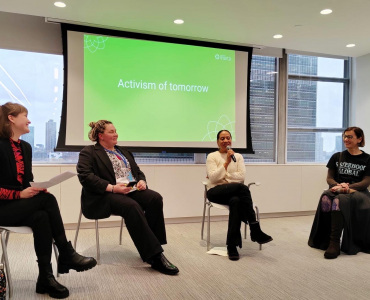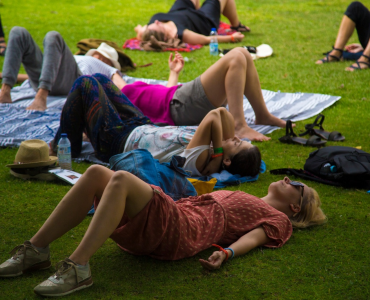Violence against women has no specific age
Violence against women has no specific age. Most often elderly women do not talk about violence that they have experienced; statistics show that globally in 80 % of cases women do not report to anyone about the experience.
MARTA’s discussions with Latvian medical workers - doctors, general practitioners, doctors from emergency medical services, home care specialists that in their daily practice encounter elderly women, who in their daily life experience violence, reveal that, possibly, in Latvia the number of women, who are not reporting violence, could be even higher.
In the framework of EU WHOSEFVA project “Working with Healthcare Organisations to Support Elderly Female Victims of Abuse” MARTA invited medical workers to a round-table discussion held at P.Stradins Medical College, during which doctors pointed to urgent need to provide information, so that elderly people would recognise violence against them and would encourage people to not hide what has happened.
Doctors practicing in several regions of Latvia were of the same opinion that violence against women was equally prevalent throughout Latvia. Women both in the countryside and in cities are afraid to disclose violence; they hide what has happened and are reluctant to speak to their general practitioner or caregiver. In those cases, where women are unable to hide consequences of violence, they categorically demand not to inform the police. Women request medical assistance, however, if the doctor would report to the police, they threaten to commit suicide or not to call the ambulance anymore.
A doctor working in emergency medical service in Riga with an experience of 30 years admits that women who have suffered from violence are encountered every day and that women almost always request to not report to the police; however, medical workers are obliged to report, but, if the victim does not write an application to the police, criminal proceedings are not initiated. Sometimes ambulance doctors suggest to the victims services, where women could turn for help.
There is a pronounced trend in Latvia that elderly women, in particular, in a situation of crisis call the ambulance rather than the police. In general, one can state that in every second case, where the call is made by elderly women, violence may be suspected.
Medical specialists admit that the situation is very complicated and shelters for women, where the majority of women staying there are elderly. Medical workers, who are called to a shelter by social workers, lack information about the way women have ended up there. Reasons are different – injuries on the street or at home, often women end up in a shelter, because they have been driven out of home.
Observations of home care specialists reveal that elderly women most frequently suffer from emotional, economic and sexual violence. Cases differ, for example, an elderly woman, who worked as a baby-sitter, was sexually abused by the children’s father for a long time. She refused to report, emphasizing that the young family was in a complicated and financially difficult situation. There was a case in the practice of emergency services that an 80 years old woman had been raped with a bottle by her grandson. This woman also declined to report, protecting family relationships.
Specialists underscored that currently economical and emotional violence was very prevalent, where sons and, with growing frequency, grandsons take away women’s pensions, in approximately half of these case also physical violence is observed. These are cases noticed by medical workers, but the women themselves do not complain, because they accept this as “their fate”, failing to understand that this is violence and being unaware of their rights.
“Perhaps 20 – 30 years will pass and women will be able to speak about the experience, understand it and report about it. Women have been taught not to turn against their family members. There are cases, when neighbours or other acquaintances report. In practice such situations are encountered, when children and grandchildren of elderly women lack social and communication skills, thus relationships in the family are destructive, and women protect the honour of the family,” one of the general practitioners says.
Usually victims blame themselves, considering themselves as being a bad wife to my husband, being unable to be a good mother for my child, often they are economically dependent upon their husbands and are convinced that they could not fulfil the husband’s requests, and because of this had been beaten up by the husband. Doctors mention cases, when women had developed movement and speech impairments and a criminal case had been initiated, but women refused to continue the proceedings, because they felt dependent upon husbands. Doctors have seen cases, where the man waits for the woman outside the doctor’s office, pays for medical services and accompanies the woman home.
Rural family doctors are convinced that violence is directly linked to the difficult economic situation, which does not allow aging with dignity and providing for daily needs. Currently a model of family has evolved, where it is hard to interfere, although it is known that the son is beating his mother. Doctors cannot interfere in the family, offering assistance, but women do not agree being afraid of repeated violence. Elderly women do not speak about violence they have experienced in their youth. Women are very afraid to reveal the truth about violence.
Today medicine allows prolonging life, but this causes new problems – old people are placed into residential homes or are being neglected, thus subjecting them to emotional violence. Therefore there is acute need to provide a psychologist’s support to elderly women, as it is done elsewhere in Europe. General practitioners believe that primary care practices need a psychologist, but are not hiding that elderly women due to lack of understanding are very afraid of psychologists. In elderly women in Latvian often suicidal thoughts are observed; women, in particular, show sings of depression and anxiety, because they have huge workload in daily life and feel guilty about failing to cope with their duties.
Doctors are convinced that informing society and public awareness raising is most important, because it is important to recognise the problem and to be aware that it is violence.


